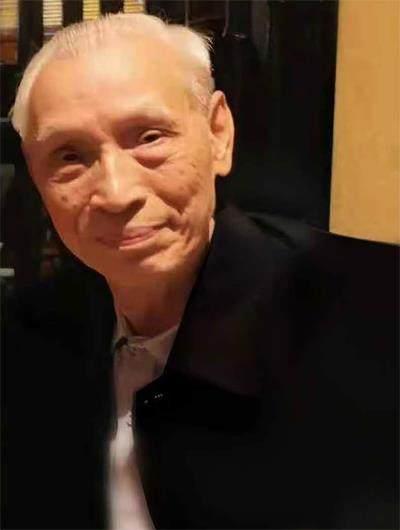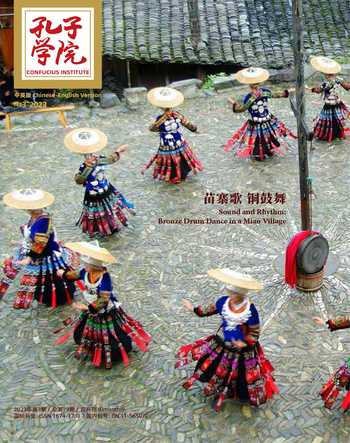专家访谈:关于孔子学院建设的思考与展望
2023-11-18陆俭明
陆俭明

问:陆教授,感谢您在百忙之中接受我们的邀约。请您谈谈孔子学院现在的情况好吗?
陆:我一直很关心国际中文教育,也知道孔子学院的一些情况。据我所知,我们自2004年11月在韩国建立第一所孔子学院以来,截至2019年12月,已在162个国家,地区建立了550所孔子学院、1172个中小学孔子课堂;而从2020年7月至2021年7月,又新增了9所孔子学院。孔子学院的建立,对汉语和中国文化走向世界起了一定的作用。同时也应该看到,由于各种原因,部分孔子学院出现了关停现象。这需要我们思考,如何进一步加强孔子学院的建设。
问:那您认为,在新时期,尤其是孔子学院转隶后,孔子学院建设和发展的主要任务是什么?
陆:之前的孔子学院章程中对孔子学院的任务有明确的规定,包括开展汉语教学、培训{叉语教师、提供汉语教学资源、开展汉语考试和汉语教师资格认证、提供中国教育和文化等信息咨询、开展中外语言文化交流活动等。我个人认为,除了“开展汉语考试和汉语教师资格认证”,孔子学院应特别注重做好以下三件事:一是努力培训好本土汉语教师;二是积极协助所在国切实推进中文教育;三是努力促进所在国与中国的文化交流。关于是否将“开展汉语教学”作为孔子学院的刚性任务,这需要充分讨论。
问:能否请您具体谈一下,如何培养本土教师?
陆:孔子学院一个很重要的任务,就是努力培养了解中国文化、能胜任汉语教学和中外文化交流的本土汉语教师。要知道,在各国开展国际中文教育,其教学任务主要应该由当地汉语教师来承担。这不仅有利于各国,对中国也有好处。
陆:对各国而言:第一,有助于更好地与中国交往与交流。各国的汉语教师将会起到桥梁与纽带的作用。第二,有助于各国更全面、更深入地了解中国,了解中国文化。各国政要和民众,想要全面深入地了解中国及中国文化,主要是通过他们的了解中国国情的汉学家、汉语教师的介绍,以及翻译人员对中国古今经典作品,包括影视作品的翻译来实现的。第三,有助于各国更好地开展中文教育。中国和各国之间友好关系的发展,必然要求各国不断发展中文教育,这就得靠各国的汉语教师。
陆:对中国当然也有好处。各国的汉语教师队伍不断扩大,说明在各国的汉语教学开展得好。而这无疑有助于中国跟各国全方位地交流与合作,有利于中国的发展。同时,由于文化的差异、思维方式的不同,本地汉语教师在教学中比我们更了解学生的心理,更了解教学的重点,更了解学生学习中文的难点,他们能根据教材的内容,信手拈来与对象国国情,当地风土人情相关的例子,这是志愿者汉语教师望尘莫及的。
陆:此外,本土汉语教师为了自己的职业发展,会更加积极地推动中文教育,这是促进汉语教学在各国更为广泛开展的一个重要的助推力量,也是一个重要的条件。目前,中文教育在海外多数国家只处于开始阶段,还需要一段时间才能培洲出一支具有一定数量的本土汉语教师队伍,在此之前,依然需要根据所在国的要求选派汉语教师。但是,派出的汉语教师必须是高质量的,能在业务上、具体教学上真正起到帮助和指导作用的。总之,各国孔子学院一定要将培训所在国本土汉语教师当作自己的一项重要任务来抓!
问:那么如何培训好本土汉语教师呢?
陆:培训本土汉语教师必须争取当地教育机构的支持。具体可以做三方面工作:一是举办培训班;二是由孔子学院出面定期或不定期地组织有利于提高当地汉语教师素养与能力的专题报告;三是定期或不定期地帮助(包括资助)当地教育机构举办汉语教师教学交流会。但是,这样的活动不要流于形式,一定要讲究实效。
问:您认为如何协助所在国切实搞好中文教育呢?
陆:积极协助各国搞好汉语教学,培养各国需要的各类汉语人才,这也是各国孔子学院应担起的任务。孔子学院要关心和深入了解所在国中文教育的各方面情况,包括政府的、民间的。
陆:国际中文教育发展到一定的阶段时需要妥善处理好一些关系,一是与所在国教育机构的关系,二是与在当地开展汉语教学的华侨、华裔的关系。派出的教师必须是富有教学经验、高水平的汉语教师,这样才能担負起指导当地汉语教学的任务。
陆:在积极协助所在国切实搞好中文教育方面,我觉得可以做三方面的工作:其一,帮助培训在岗/在职的中文教师;其二,为政府、民间的中文教育机构提供中文教育必需的有关教学资源;其三,帮助或台作编写有针对性的成系列的学生爱看爱学、教师好用好教的本土化汉语教材。
问:您认为该如何更好地培养培训在岗/在职的汉语教师?
陆:汉语教师培洲班该怎么搞呢?首先,要明确汉语教师一定要打好三个基础——知识基础、能力基础、思想心理素质基础。知识基础,重要的是汉语言文字学和中国文化的知识基础。其中,汉语言文字学基础更为重要,因为这是汉语教师能获取中国文化知识的条件和基础。能力基础,重要的是教学技能和研究能力。现在一般都比较注重教学技能的提高,这当然需要;但是研究能力极为重要。为什么?要知道,在中文教育过程中教师会碰到来自各方面的、各种各样的疑难问题。所谓“来自各方面”,是说有的来自教师自己备课,有的来自学生提问,有的来自学生出现的偏误;所谓“各种各样的”,是指会有语音方面的、文字方面的、词汇方面的、语法方面的、用法方面的、写作方面的,等等。譬如:“很阳光”中的“阳光”,是名词还是已经变成了形容词?理由呢?
陆:这类问题,一般部找不到现成的答案,很多情况下需要自己去思考、研究,因此本土汉语教师一定要具备一定的汉语研究能力。本土汉语教师开展这方面的研究,好处是很大的——既可以出研究成果,又可以不断充实教学内容。
陆:在思想心理素质基础方面,本土汉语教师需要具备两种素养:一种是高度的教育责任心,要有爱心、诚信;一种是亲和力。这将大大有助于提高汉语教学质量和成效。
陆:办培训班的目的就是要进一步夯实本土汉语教师这三方面的基础。办培训班,事先一定要做好培训计划,即:办多少期?每期培训多少汉语教师?每一期的主题是什么?该请什么样的学者专家来做报告?对受训的汉语教师有什么具体要求?
陸:需要注意的是,参加培训班的本土汉语教师具体是哪些人,应由孔子学院中外方共同决定。同时,也积极欢迎所在国的汉语培洲机构和教育机构的人员参加。
陆:培训班,也需要有这样一项培训内容——汉语教师教学交流会。
陆:每期培训班结束后,必须做好总结工作。
问:刚才您说了应特别注重的三项任务,最后一项是切实做好中国和所在国的文化、教育等各方面的交流,这个问题也请您简单地阐述一下好吗?
陆:文化交流不仅是推动世界文化进步的重要条件,也是使各国文化日益丰富的重要条件。文化交流具有双重性质——必然性和双向性。这是由文化的动态性决定的。具体体现在两个方面:一是从纵向来看,文化具有时代性,这跟人类对客观世界、对自身的认识不断变化与深化有关。因此,文化是人类社会历史发展的积淀物,具有历史传承与发展的特性;各民族、各个国家的文化都有历史的印记。二是从横向来看,文化具有民族性、地域性,而不同民族与国家之间的相互接触必然会造成文化的互相交流,因此可以说,文化传播具有“必然性”。这是因为任何民族、任何国家都希望将自己的文化住外传播,让其他民族、其他国家了解、认可乃至认同、吸纳,尽可能地使自己的文化融入国际多元文化宝库中去;同时,任何民族、任何国家也需要了解剐的民族、别的国家的文化,从中吸取自己所需要的营养,以不断丰富自己民族、自己国家的文化。
陆:孔子学院,重在从语言入手,必须将文化交流当作一项重要任务来抓。
Reflections and Prospects on the Development of Confucius Institutes
Q:Professor Lu, thank you for taking the time out of your busy schedule.Could you rst give us an overview of the development of ConfuciusInstitutes?
Lu: I’ve always had a keen interest in internationalChinese education, and I closely follow its progress. Tothe best of my knowledge, the rst Confucius Institutewas set up in South Korea back in November 2004.Since then, up until December 2019, a total of 550Confucius Institutes and 1,172 Confucius Classroomsin primary and secondary schools have been successfullyestablished across 162 countries and regions.Additionally, from July 2020 to July 2021, seven newinstitutes were introduced, bringing the overall countto 557. These Confucius Institutes have significantlycontributed to the promotion of Chinese languageand culture worldwide. However, it is important toacknowledge that certain institutes have faced closurefor various reasons. This requires introspection on ourpart to further enhance the development of ConfuciusInstitutes.
Q:What do you believe are the primary responsibilitiesinvolved in setting up andadvancing Confucius Institutes in the newera, particularly now that they are not operatedby the government?
Lu: Previously, the mandate of Confucius Institutesencompassed various tasks, such as conducting Chineselanguage instruction, training Chinese languageeducators, providing resources for Chinese languageteaching, organizing Chinese language exams and certi cation for teachers, o ering information and consultationon Chinese education and culture, and fosteringcultural and linguistic exchanges between China andthe wider world. In my view, while retaining “organizingof Chinese language exams and certification forteachers”, Confucius Institutes should focus on threekey areas: training local Chinese language instructors,assisting the host country in enhancing Chinese languageeducation, and promoting cultural exchangesbetween the host country and China. Whether to make“Chinese language teaching” a mandatory obligationfor Confucius Institutes, however, requires in-depthdiscussion.
Q:Could you please provide specific insights on training local teachers?
Lu: One of the crucial responsibilities of ConfuciusInstitutes is to focus on the development oflocal Chinese language teachers who possess a deepunderstanding of Chinese culture, are proficientin teaching Chinese, and actively promote culturalexchanges. It’s worth noting that when it comes to internationalChinese language education, the primaryrole of teaching should be entrusted to local Chineselanguage teachers. This not only benefits the hostcountries but also bene ts China.
Lu: For host countries, this provides severalkey advantages. Firstly, it facilitates enhancedcommunication and exchanges with China, as theseteachers can act as bridges and links between thetwo countries. Secondly, it contributes to a morecomprehensive and profound understanding of Chinaand its culture. Political leaders and individualsseeking a comprehensive understanding of China andits culture mainly rely on Sinologists and Chineselanguage teachers who possess knowledge of China’snational conditions. Additionally, translations ofclassic works, including literary and lm productions,also aid in this understanding. Lastly, this approachpromotes the development of Chinese languageeducation within these countries. The continuousdevelopment of Chinese language education is crucialfor fostering friendly relations between China and therest of the world, and it heavily relies on the e orts oflocal Chinese language teachers.
Lu: This bene ts China as well. The growing numberof Chinese teaching staff signifies the successfulimplementation of Chinese language education ina country. Undoubtedly, this contributes to China’scomprehensive communication and cooperation withother countries, ultimately advancing China’s own development.Moreover, due to cultural differences anddistinct way of thinking, local Chinese teachers possessa better understanding of students’ perspectives,priorities, and the di culties they face while learningChinese. They e ortlessly provide examples relevant tolocal customs and practices, which surpass the capabilitiesof volunteer Chinese teachers.
Lu: Furthermore, driven by their desire for personaland professional growth, local Chinese educatorswill be even more motivated to promote Chinese education.They play a crucial role and are indispensablefor the widespread adoption of Chinese teaching with-in their own country. Currently, Chinese educationis still in its early stages in most countries,necessitating a signi cant investment of time tocultivate a pool of skilled local Chinese teachingprofessionals. Until then, the selection ofChinese teachers must align with the requirementsof the host countries. Nonetheless, theChinese teachers dispatched from China shouldpossess exceptional quali cations and genuinelyplay a supportive and guiding role in teaching.To sum up, Confucius Institutes worldwide mustprioritize the training of local Chinese teachersas a paramount objective.
Q:So, what are the key factors to ensure the e ective training of local Chinese language teachers?
Lu: It is crucial to garner support from localeducational institutions. There are three mainaspects to consider in this regard. Firstly, it is imperativeto o er comprehensive training courses.Secondly, Confucius Institutes should regularlyorganize workshops aimed at enhancing thecompetence and skills of local Chinese languageteachers. Thirdly, it is vital to provide assistance,including nancial support, to local educationalinstitutions in hosting symposiums on Chineselanguage teaching on a regular or ad hoc basis.However, it is crucial to avoid treating these activitiesas mere formalities and instead prioritizetheir practical effectiveness.
Q:How do you think we can effectively assist a host country in promoting Chinese education?
Lu: It’s important for us to actively support the hostcountries in improving Chinese language education andcultivating the specific types of Chinese talents they need.This responsibility also lies with Confucius Institutes. It’simportant for Confucius Institutes to genuinely care aboutand deeply understand all aspects of Chinese education inthe host country, including both its governmental and nongovernmentalsectors.
Lu: When Chinese education has gained traction in a hostcountry, it is crucial to handle relationships appropriately.This involves two key aspects: building strong connectionswith educational institutions in the host country andfostering positive relationships with local ethnic Chinesewho are involved in teaching Chinese language. To e ectivelyaccomplish these goals, it is essential to dispatch experiencedand highly skilled Chinese language teachers who can guideand support local Chinese language education.
Lu: To effectively assist the host country in promotingChinese education, I believe there are three areas that can befocused on. Firstly, e orts should be made to provide trainingfor Chinese language teachers currently working in the eld.Secondly, resources needed for Chinese education institutions,be they governmental or non-governmental, should be madeavailable. And thirdly, collaboration should be encouraged inthe development of localized Chinese textbooks that are bothengaging for students and useful for teachers.
Q:What strategies do you suggest for providing on-the-job training to Chinese teachers?
Lu: How should we organize Chinese teachertraining courses? First of all, it is important to establishthree foundations for Chinese teachers — knowledge,skills, and psychological qualities. Knowledge is crucial,particularly in the areas of Chinese linguistics andChinese culture. Among the two, a solid foundationin Chinese linguistics is more important because itserves as the basis for Chinese teachers to acquireknowledge of Chinese culture. Skills includes teachingskills and research abilities. Currently, there is agreater emphasis on improving teaching skills, whichis certainly necessary, but research abilities are alsoextremely important. Why is that? Well, during theprocess of Chinese education, teachers may encounterchallenges of different sorts. The difficulties may lie inpronunciation, writing, vocabulary, grammar, usage,composition, and so on. For example:
Is 陽光 in the phrase 很阳光 still functioning as a noun, or has it transformed into an adjective?Why is that?
Lu: There isn’t a ready-made answer to this typeof question. In many cases, it requires teachers themselvesto engage in critical thinking and conduct research.Therefore, local Chinese teachers should possessresearch abilities in the Chinese language. Doingresearch can yield significant benefits, not only bygenerating research ndings but also by continuouslyenriching teaching materials.
Lu: In terms of psychological attributes, localChinese language teachers should possess two keyqualities. Firstly, they should demonstrate a strongsense of responsibility, compassion, and integrity.Secondly, they should have excellent interpersonalskills. These attributes will greatly contribute to thequality and e ectiveness of their instruction.
Lu: The primary objective of workshops is to enhanceand reinforce these three competences. Whenorganizing such workshops, it is crucial to create ameticulously designed program. This involves determiningthe session count, the suitable capacity ofChinese language teachers for each session, the speci ctraining topics for each session, selecting the appropriateindividuals to deliver lectures, and establishingthe prerequisites for participants’ involvement.
Lu: It is worth emphasizing that the selection ofparticipants should be a collaborative e ort betweenthe Confucius Institute and the foreign institutions.Additionally, the workshop should be inclusive,allowing personnel from Chinese language traininginstitutions and educational establishments in thehost country to participate as well.
Lu: The workshops must incorporate opportunitiesfor teachers to engage in exchanges and discussionsabout Chinese language teaching among themselves.
Lu: Following the conclusion of each workshop,it is essential to conduct a comprehensive review andevaluation.
Q:Earlier, you mentioned three tasks thatrequire special attention. The final one is toeffectively promote cultural and educationalexchanges between China and the hostcountry. Could you please provide a briefexplanation of this matter?
Lu: Cultural exchange is not only a crucial catalystfor global cultural growth, but also a key element infostering cultural diversity. It embodies a two-foldnature — inescapability and reciprocation. This binaryaspect is an intrinsic part of the evolving nature ofculture, and manifests in two aspects. On one hand,when viewed from a longitudinal perspective, culture isa dynamic entity, shaped by shi ing perceptions of theself and the world around us. Thus, culture representsthe accumulation of humanity’s social history, exhibitingthe traits of historical continuity and progression.Every race and country carry the indelible marks ofhistory within their cultures. On the other hand, froma horizontal perspective, culture is influenced by bothrace and region. It’s this innate interplay among variousraces and countries that sparks cultural exchange.Therefore, it’s safe to say that the spread of culture is an“inevitability”. Every race and country have an inherentdesire to share their culture with others, hoping formutual understanding, acceptance, and even for theassimilation and absorption of their cultural elementsby others. At the same time, each race or country seeksto understand and draw from other cultures, which inturn, enriches their own culture.
Lu: Therefore, while Confucius Institutes start fromlanguage teaching, it is essential to prioritize culturalexchanges in their work.
